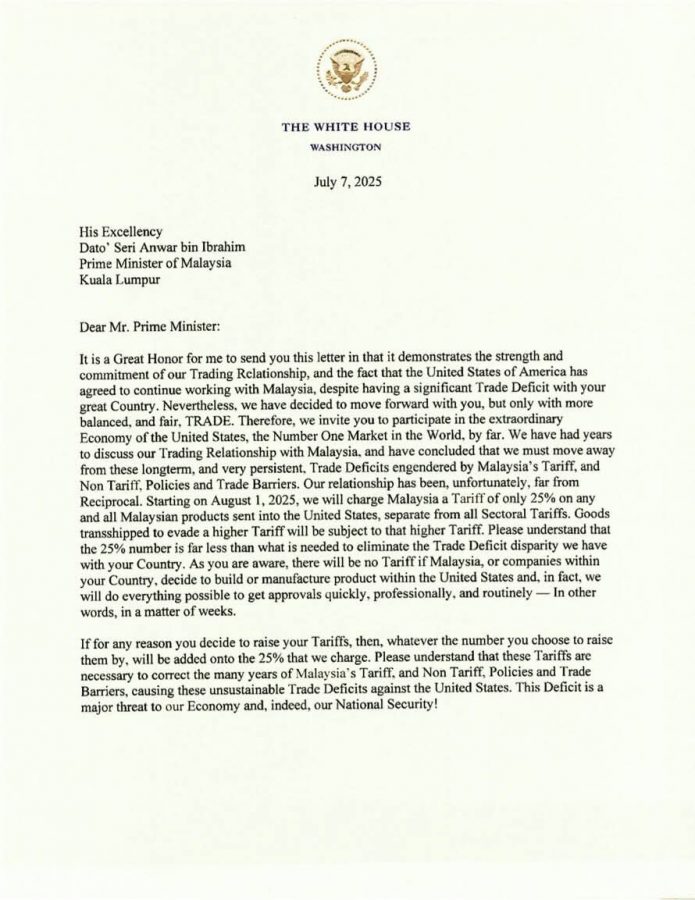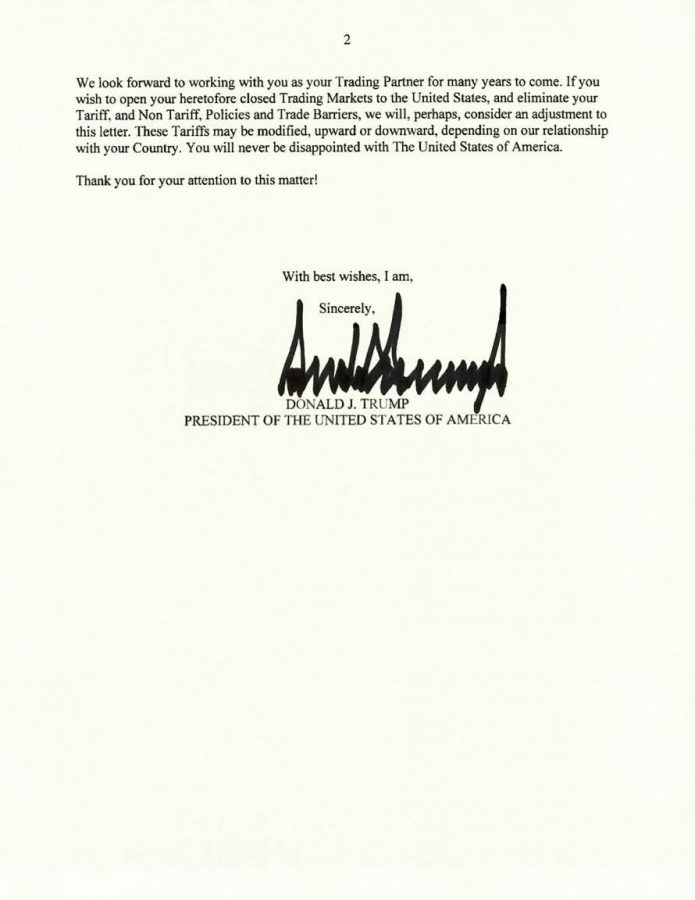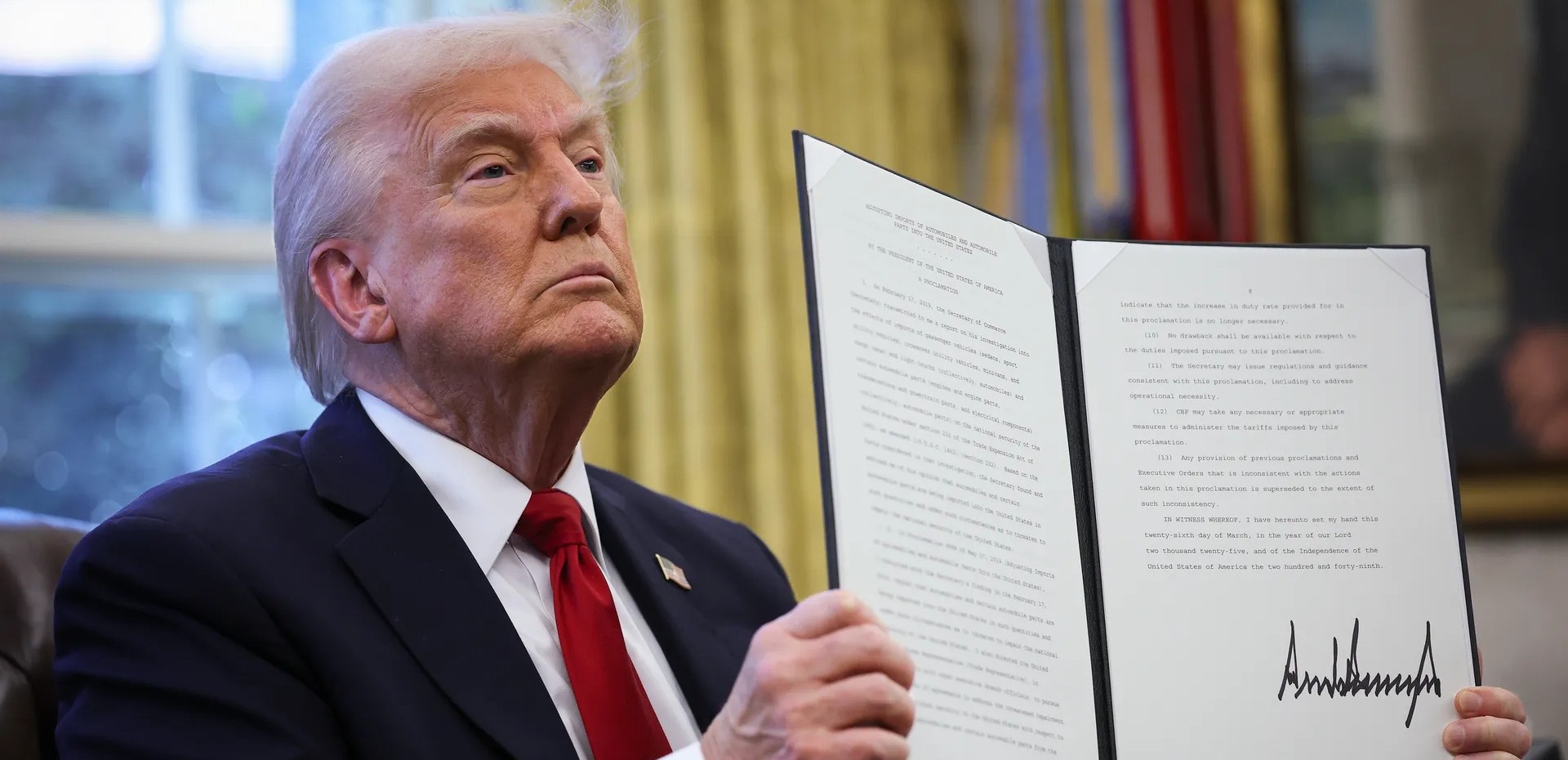As critics point to a politically timed pivot, President Trump’s latest tariff salvo against Malaysia has raised eyebrows – and tensions – with sweeping trade measures taking effect August 1.
At the behest of Donald Trump, the United States will impose a 25% tariff on Malaysian goods beginning August 1, a move announced by President Trump as part of what he described as a broader effort to address the US trade deficit. The rate, he said, is “far less” than what would be required to fully balance the books with Malaysia.
This new tariff exceeds the 24% rate previously levied on select Malaysian exports, which had been under a 90-day pause. That temporary reprieve ended today.
In a letter addressed to Prime Minister Anwar Ibrahim – and publicly posted on Trump’s Truth Social platform – the US president criticised Malaysia’s trade policies as “one-sided and non-reciprocal.” Trump noted that the 25% tariff would remain in place unless Malaysia revised its approach.
He also made clear that this new tariff would apply on top of any existing sector-specific tariffs already in force. Any attempt to redirect exports through third countries to circumvent the measures, he said, would trigger the higher rate anyway.
Should Malaysia retaliate with tariffs of its own, Trump warned that a further 25% tariff would be levied in response. (One political observer commented, “Talk about one-sided! What a bullying stance to take!”)
“Please understand that these tariffs are necessary to correct the many years of Malaysia’s tariff and non-tariff policies and trade barriers, which have caused these unsustainable trade deficits against the US,” the letter read.


Economists and experts across the political spectrum have repeatedly stressed that Trump’s understanding of tariffs and trade imbalances is flawed. Trade deficits do not mean that one country is being “ripped off” or “treated very unfairly,” as Trump has remarked.
For example, most of the vanilla sold in the United States comes from Madagascar, a relatively poor, small country off the eastern coast of Africa. Unsurprisingly, Madagascar does not import a huge volume of goods from the US, so there is a trade imbalance, owing to Americans’ desire for vanilla, which is not produced in any meaningful quantity in the US. This does not mean Madagascar is ripping off the United States, but merely that they are offering a particular good that Americans want, but that is not produced in the US.
While Trump reiterated America’s commitment to its trading relationship with Malaysia, the messaging has been sharply criticised by trade analysts and political observers. Some have suggested that the sudden resumption of tariff talks is being used to draw attention away from the massive federal spending bill recently passed by the Trump administration – a piece of legislation that has been widely panned by both Democrats and Republicans as bloated, cruel, and unsustainable.
In what some see as a familiar tactic, Trump has falsely framed the tariffs as a way to protect American jobs and level the economic playing field. He also encouraged Malaysian companies to invest directly in the US instead of exporting goods, saying such moves would exempt them from the new tariffs.
“There will be no tariff if Malaysia, or companies within your country, decide to build or manufacture products within the US,” Trump wrote, adding that American authorities would “do everything possible to get approvals quickly, professionally, and routinely.”
The letter to Malaysia is one of several reportedly sent to trading partners including Japan, South Korea, Indonesia, Bangladesh, Thailand, and South Africa, suggesting the start of another sweeping phase in Trump’s trade agenda. Laos, among the poorest countries in Asia, was hit with a whopping 40% tariff.
As mentioned, critics have noted the sudden pivot coming on the heels of Trump’s massive spending bill, which passed the Senate and the House by exceedingly thin margins last week (and fully along party lines). Trump signed the bill into law on July 4. The so-called “Big Beautiful Bill,” which will strip health insurance from millions of Americans and remove food assistance from the needy in order to pay for sweeping tax cuts that largely benefit the rich, has been revealed in every poll conducted to be exceedingly unpopular with Americans of all political affiliations.
It has been suggested that the return to Trump’s disastrous trade and tariff policies is meant to serve as a distraction from the spending bill, as well as from the horrific tragedy still unfolding in Texas – where the death toll has risen to over 100 in the wake of catastrophic flash flooding – that some say resulted from the failure of agencies Trump and his Elon Musk-headed “Department of Government Efficiency” gutted with mass firings and budget cuts.





















